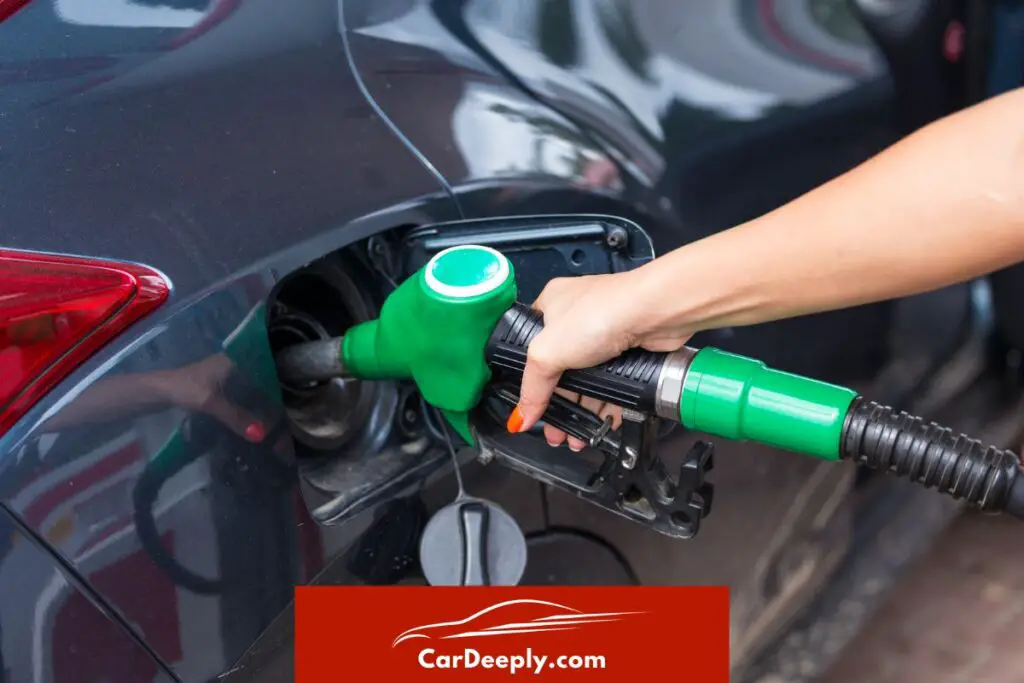Understanding how long a gallon of gas lasts can save you from unexpected pit stops and fuel-related mishaps.
This article is your guide to becoming a fuel efficiency expert, offering practical advice and tips you can apply immediately.
You’ll discover:
- Factors influencing gas mileage
- How to calculate fuel efficiency
- Tips for maximizing your miles per gallon
By the end of this read, you’ll be well-equipped to make the most out of every gallon.
So, buckle up, and let’s dive into the world of fuel efficiency!
Advertising links are marked with *. We receive a small commission on sales, nothing changes for you.
Key Takeaways

- Gas mileage, or MPG, is the distance a car can travel on a gallon of gas.
- MPG varies based on car type, driving habits, and maintenance.
- Regularly tracking your MPG can help spot potential car issues.
- Running empty can damage your car’s fuel filter, fuel pump, and engine.
- Improving MPG involves smooth driving, regular maintenance, and avoiding unnecessary weight.
How Long Does a Gallon of Gas Last?
The duration a gallon of gas lasts depends on your vehicle’s fuel efficiency, often measured in miles per gallon (MPG).
On average, a gallon of gas can last 25 to 30 miles for most passenger cars, but this can vary significantly based on factors like driving habits, vehicle type, and road conditions.
Understanding Gas Mileage
Gas mileage, or fuel-efficiency, is a term you’ve probably heard before.
But what does it mean?
Simply put, it’s the distance your car can travel on a single gallon of gas. It’s measured in miles per gallon (MPG), a crucial factor for anyone who drives.
Why is MPG Important?
Knowing your car’s MPG can help you:
- Estimate travel costs
- Plan long trips
- Reduce fuel consumption
It’s not just about saving money; it’s about being a responsible driver and reducing your carbon footprint.
How to Calculate Your Car’s Gas Mileage
Calculating your car’s MPG is something other than rocket science. It’s a simple process that anyone can do. Here’s a step-by-step guide:
- Fill up your gas tank
- Reset your trip odometer
- Drive until you need to refuel
- Note the miles driven
- Divide the miles by the gallons used
This gives you your car’s MPG. But remember, it’s not a one-time calculation. Your MPG can change based on various factors, so keeping track of time is important.
The Importance of Tracking Average MPG
Tracking your average MPG can help you:
- Spot potential issues
- Improve fuel efficiency
- Maintain your vehicle
If your MPG suddenly drops, it could be a sign of a problem with your car. Regular tracking can help you catch these issues early.
Average MPG for Different Types of Vehicles
The MPG varies greatly depending on the type of vehicle. Here are some averages:
- Cars: 20-30 MPG
- SUVs: 15-20 MPG
- Light trucks: 10-17 MPG
Electric cars use a measurement called MPGe (miles per gallon equivalent), which compares the energy content of different fuels. The most fuel-efficient electric vehicles can achieve over 100 MPGe!
Most Fuel-Efficient Vehicles
If you’re looking for a fuel-efficient vehicle, here are some options:
- Hyundai Ioniq Electric: 136 MPGe
- Tesla Model 3: 134 MPGe
- Chevrolet Bolt EV: 118 MPGe
Remember, these are just averages. Your actual MPG will depend on how and where you drive. But you can make smarter driving habits and vehicle choices by understanding gas mileage.
Factors Affecting Your MPG
Your car’s MPG is flexible. It can fluctuate based on a variety of factors. Let’s explore some of them:
Type of Car and Engine
Different cars have different fuel efficiencies. Smaller cars tend to be more fuel-efficient than larger ones. Similarly, vehicles with smaller engines usually have better MPG than larger ones.
Driving Style and Habits
How you drive can significantly impact your MPG. Aggressive driving, rapid acceleration, and high speeds can lower fuel efficiency. On the other hand, smooth and steady driving can improve it.
Traffic Conditions
Stop-and-go traffic can be a fuel efficiency killer. Constant acceleration and braking can consume more fuel than steady driving at a constant speed.
Tire Pressure
Under-inflated tires can lower your MPG. They create more resistance, which means your car needs more fuel to move.
Car Maintenance
Regular maintenance can help keep your car’s MPG at its best. This includes frequent oil changes, air filter replacements, and spark plug checks.
Terrain
Hilly or mountainous terrain can lower your MPG. Your car needs more fuel to climb hills than to drive on flat roads.
Use of Electrical Equipment
Using your car’s electrical equipment, like air conditioning or heated seats, can also affect your MPG.
Use of 4×4
Engaging 4×4 mode increases fuel consumption. It’s best to use it only when necessary.
Towing/Hauling
Towing a trailer or carrying heavy loads can significantly lower your MPG.
Consequences of Running on Empty
Running on empty is about more than just the risk of getting stranded. It can also damage your car. Here’s how:
Risks of Getting Stranded
Running out of fuel can leave you stranded in potentially dangerous situations. It’s always best to keep your tank at least a quarter full.
Potential Damage to the Fuel Filter, Fuel Pump, and Engine
Running on empty can cause damage to your car’s fuel filter, fuel pump, and engine. The bottom of your fuel tank can contain dirt and debris, which can clog your fuel filter if you run your car on empty. This can also damage your fuel pump and, potentially, your engine.
How to Improve Your Car’s MPG
Improving your car’s MPG isn’t just about choosing the right vehicle. It’s also about how you drive and maintain your vehicle. Here are some tips:
- Drive smoothly
- Maintain a steady speed
- Avoid rapid acceleration
- Keep your tires properly inflated
- Regularly maintain your car
- Limit the use of 4×4
- Limit the use of electrical equipment
- Avoid carrying unnecessary weight
By following these tips, you can maximize your car’s MPG and get the most out of every gallon of gas.
Frequently Asked Questions
How does the type of fuel affect my car’s MPG?
The type of fuel you use can have a significant impact on your car’s MPG. Premium fuels often provide better fuel efficiency than regular ones due to their higher octane rating. However, the difference is usually minimal and may not justify the higher cost.
Does the weather affect my car’s MPG?
Yes, weather conditions can affect your car’s MPG. Cold weather can increase fuel consumption as your engine takes longer to reach its most efficient temperature. Additionally, using the heater or defroster can also increase fuel consumption.
How does idling affect my car’s MPG?
Idling can significantly lower your car’s MPG. When your vehicle is idling, it’s getting 0 MPG. If you’re waiting for more than a minute, turning off the engine and restart it when ready is more fuel-efficient.
Can the use of cruise control improve my car’s MPG?
Cruise control can help improve your car’s MPG by maintaining a steady speed, which is more fuel-efficient than varying your speed. However, it’s most effective on flat roads and can decrease MPG on hilly terrain.
How does the weight of my car affect its MPG?
The heavier your car, the more energy it needs to move, which can lower your MPG. Removing unnecessary weight, like heavy items in the trunk, can help improve your car’s fuel efficiency.
Conclusion
Understanding how long a gallon of gas lasts and how to maximize it is crucial for every driver. It’s not just about saving money; it’s about being a responsible driver and reducing your carbon footprint.
By understanding the factors that affect your MPG and how to improve it, you can make smarter decisions about your driving habits and vehicle choice.

Sebastian loves convertibles and drove a BMW 335i for a long time (325 hp is just a dream). Today, with two children, he is more concerned with SUVs and family-friendly vehicles. In addition to an Audi A4 Avant, he also drives a Cupra Formentor VZ – even as a family man, you can’t do without speed. Get to know Sebastian better and visit the About Us page.
Advertising links are marked with *. We receive a small commission on sales, nothing changes for you.

